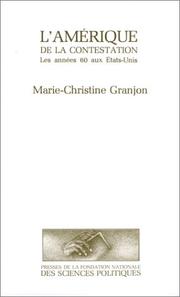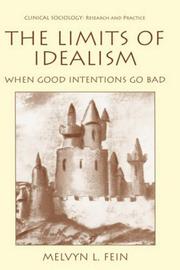| Listing 1 - 3 of 3 |
Sort by
|

ISBN: 2724605144 9782724605143 Year: 1985 Publisher: Paris : Presses de la Fondation nationale des sciences politiques,
Abstract | Keywords | Export | Availability | Bookmark
 Loading...
Loading...Choose an application
- Reference Manager
- EndNote
- RefWorks (Direct export to RefWorks)
Bibliotheek François Vercammen
Radicalism --- Radicalisme --- History --- Histoire --- Radicalism - United States - History - 20th century

ISBN: 0791451208 0791451194 9780791451199 9780791451205 Year: 2001 Publisher: Albany (N.Y.) : State university of New York press,
Abstract | Keywords | Export | Availability | Bookmark
 Loading...
Loading...Choose an application
- Reference Manager
- EndNote
- RefWorks (Direct export to RefWorks)
"Placing the philosopher John Dewey and the poet William Carlos Williams together - two important figures of twentieth-century American culture - this book examines the ambitions and failings of progressive liberal culture during the first half of the twentieth century. This book shows that, while their work ostensibly shares little in common, Williams and Dewey share the ambition to realize the radical potential of a democratic cultural politics. Including close readings of texts like Williams's Spring and All, In the American Grain, and Paterson, and Dewey's Individualism Old and New and Art as Experience, Beck offers an important contribution to current debates over the relationship between politics and cultural production."--BOOK JACKET.
Politics and culture --- Politics and literature --- Political culture --- Radicalism --- Political poetry, American --- History --- History and criticism. --- Politique et littérature --- Radicalisme --- Poésie politique américaine --- Culture --- Culture politique --- Politik --- Literatur --- Kultur --- Political and social views. --- Political culture. --- Political poetry, American. --- Political science. --- Politics and culture. --- Politics and literature. --- Radicalism. --- Histoire --- Histoire et critique. --- Aspect politique --- Williams, William Carlos, --- Dewey, John, --- Williams, William Carlos --- Dewey, John --- Pensée politique et sociale. --- Et la science politique. --- 1900-1999. --- United States --- États-Unis --- United States. --- Politics and government --- Politique et gouvernement --- Politik. --- Literatur. --- Kultur. --- Williams, William Carlos. --- Dewey, John. --- Politics and culture - United States - History - 20th century. --- Politics and literature - United States - History - 20th century. --- Political culture - United States - History - 20th century. --- Radicalism - United States - History - 20th century. --- Political poetry, American - History and criticism.

ISBN: 0306462117 0585296014 Year: 1999 Volume: *1 Publisher: New York : Kluwer Academic/Plenum Publishers,
Abstract | Keywords | Export | Availability | Bookmark
 Loading...
Loading...Choose an application
- Reference Manager
- EndNote
- RefWorks (Direct export to RefWorks)
If the truth be known, I am only a partially reformed idealist. In the secret depths of my soul, I still wish to make the world a better place and sometimes fantasize about heroically eradicating its faults. When I encounter its limitations, it is consequently with deep regret and continued surprise. How, I ask myself, is it possible that that which seems so fight can be a chimera? And why, I wonder, aren't people as courageous, smart, or nice as I would like? The pain of realizing these things is sometimes so intense that I want to close my eyes and lose myself in the kinds of daydreams that comforted me as a youngster. One thing is clear, my need to come to grips with my idealism had its origin in a lifetime of naivet6. From the beginning, I wanted to be a "good" person. Often when life was most treacherous, I retreated into a comer from whence I escaped into reveries of moral glory. When I was very young, my faith was in religion. In Hebrew school, I took my lessons seriously and tried to apply them at home. By my teen years, this had been replaced by an allegiance to socialism. In the Brooklyn where I grew up, my teachers and relatives made this seem the natural course. When I reached my twenties, however, and was obliged to confront a series of personal deficiencies, psychotherapy shouldered its way to the fore.
Idealism --- Radicalism --- History --- Idealism -- History -- 20th century. --- Radicalism -- History -- 20th century. --- Radicalism -- United States -- History -- 20th century. --- Social sciences. --- Business. --- Management science. --- Public health. --- Education. --- Sociology. --- Social Sciences. --- Sociology, general. --- Education, general. --- Business and Management, general. --- Public Health. --- 20th century --- United States --- Community health --- Health services --- Hygiene, Public --- Hygiene, Social --- Public health services --- Public hygiene --- Social hygiene --- Health --- Human services --- Biosecurity --- Health literacy --- Medicine, Preventive --- National health services --- Sanitation --- Quantitative business analysis --- Management --- Problem solving --- Operations research --- Statistical decision --- Trade --- Economics --- Commerce --- Industrial management --- Children --- Education, Primitive --- Education of children --- Human resource development --- Instruction --- Pedagogy --- Schooling --- Students --- Youth --- Civilization --- Learning and scholarship --- Mental discipline --- Schools --- Teaching --- Training --- Social theory --- Social sciences --- Education --- Animism --- Monism --- Personalism --- Philosophy --- Positivism --- Dualism --- Materialism --- Realism --- Transcendentalism
| Listing 1 - 3 of 3 |
Sort by
|

 Search
Search Feedback
Feedback About UniCat
About UniCat  Help
Help News
News